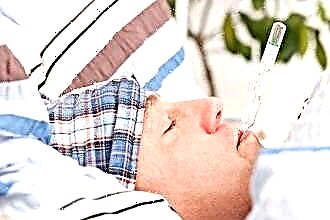Inflammation of the tonsils - tonsillitis - is much more common in children than in adults. Unfortunately, this disease very quickly becomes chronic, and it can be difficult to diagnose it at an early stage, especially in babies. Angina is initially easy to confuse with the common cold or other "childhood" diseases: measles, whooping cough. Therefore, it is extremely important to know what symptoms of tonsillitis in children give in acute or chronic form.
Acute tonsillitis
 Tonsillitis is an infectious disease that is most often caused by pathogenic bacteria: staphylococci, streptococci, pneumococci. But there are also viral forms (for example, herpes sore throat), even less often inflammation of the tonsils is provoked by fungi.
Tonsillitis is an infectious disease that is most often caused by pathogenic bacteria: staphylococci, streptococci, pneumococci. But there are also viral forms (for example, herpes sore throat), even less often inflammation of the tonsils is provoked by fungi.
The disease has a short incubation period - the first signs of the disease appear about a day after infection, after a maximum of 48 hours. Moreover, the younger the child, the shorter this period. This is due to the fact that the immunity of infants is much weaker, and all organs are located close to each other and the infection spreads quickly.
The main signs of acute tonsillitis in a child are:
- a strong increase in body temperature up to 38.5OC and higher;
- Sharp sore throat that worsens when swallowing
- headache nausea, chills, severe weakness;
- dry throat, perspiration, barking cough is possible;
- hoarseness of voice, the child cannot speak normally;
- feeling of constant irritation in the throat;
- ear pain on one or both sides.
When examining the throat, one can notice a strong reddening of the tonsils and their significant increase in size. On days 2-3 from the onset of the disease, a whitish bloom or multiple abscesses appears on them. Older children complain of pain in the abdomen, joints, and tachycardia may occur.
If two or more of the above symptoms are detected at the same time, you should immediately call a doctor. Every hour of delay can complicate the course of the disease and provoke the development of serious complications. And self-medication in this case is not an option.
Folk remedies will give only a temporary effect, while blurring the clinical picture and complicating the diagnosis.
How not to be confused with a cold
 As you can see, in many ways the symptoms of acute tonsillitis are similar to the manifestations of a cold or ARVI, so young mothers often confuse these diseases, starting to treat the child with home remedies. Wasted time leads to the spread of infection, which can provoke complications.
As you can see, in many ways the symptoms of acute tonsillitis are similar to the manifestations of a cold or ARVI, so young mothers often confuse these diseases, starting to treat the child with home remedies. Wasted time leads to the spread of infection, which can provoke complications.
Tonsillitis from OVRI differs primarily in the absence of symptoms typical for other respiratory diseases: cough, profuse nasal discharge, swelling of the mucous membranes. Redness is noticeable on the tonsils, not the back of the larynx. The temperature rises suddenly, and with ARVI it rises gradually.
Bacterial seeding of mucus from the child's oral cavity helps to accurately diagnose angina and determine its causative agent. The doctor can take material for analysis during the initial examination of the baby - for this, it is enough to hold a sterile cotton swab around the tonsils and place the sample in a sterile test tube.
If the child's condition is satisfactory, and the doctor has doubts that he really has a sore throat, antibiotics are not prescribed to him until the results of the examination are received.
To lower the temperature, anti-inflammatory drugs and traditional methods of treatment are used.
Chronic form
The symptoms of chronic tonsillitis in children are not as pronounced as in the acute form, so many mothers do not pay attention to the slight redness of the tonsils until they notice that the baby has become sick much more often.
Sore throats in chronic tonsillitis are repeated up to 5-6 times a year - this is a very large load on a growing body.
 Chronic tonsillitis not only weakens the immune system, like any other sluggish inflammatory process, it also constantly poisons the body with toxins that are secreted by the main causative agent of the disease - streptococcus. As a result, over time, various complications begin to develop: pyelonephritis, arthritis, rheumatic heart disease, etc.
Chronic tonsillitis not only weakens the immune system, like any other sluggish inflammatory process, it also constantly poisons the body with toxins that are secreted by the main causative agent of the disease - streptococcus. As a result, over time, various complications begin to develop: pyelonephritis, arthritis, rheumatic heart disease, etc.
Chronic tonsillitis can be suspected if the child suffers from respiratory diseases with frightening frequency - up to 4-6 times during the year. The symptoms of chronic tonsillitis in children are also:
- slightly elevated body temperature (usually within the subfebrile range);
- unpleasant purulent odor in the oral cavity with healthy teeth and gums;
- recurrent sore throat, sore throat, dry feeling;
- regular dizziness, nausea, weakness and other signs of intoxication;
- increased fatigue, poor appetite, decreased activity.
Only a doctor can make a final diagnosis. However, only two factors can become sufficient grounds for it - the constantly present purulent plaque on the tonsils and frequent tonsillitis.
It is more difficult to cure chronic tonsillitis in a child than an acute form. The bacteria that provoked it, after 2-3 treated sore throats, have time to adapt to most drugs.
Therefore, in order to achieve complete recovery, one must focus on preventing exacerbations of the disease and continue to systematically destroy the foci of inflammation.
Tonsillitis in infants
 The most difficult thing is to diagnose diseases in infants. The child cannot normally express a complaint and show where he is in pain. The only reaction of a baby to a malfunction in the body is crying and changes in his behavior. Therefore, if suddenly a baby under one year old began to behave differently than usual, then the mother should pay attention to this, and not take the changes just as a whim.
The most difficult thing is to diagnose diseases in infants. The child cannot normally express a complaint and show where he is in pain. The only reaction of a baby to a malfunction in the body is crying and changes in his behavior. Therefore, if suddenly a baby under one year old began to behave differently than usual, then the mother should pay attention to this, and not take the changes just as a whim.
Until 3-4 months, a baby cannot get sick with tonsillitis in principle. The tonsils are formations of lymphoid tissue that begin to form only after birth. Therefore, a newborn's throat hurts for some other reason.
In children from six months to a year, chronic tonsillitis simply does not have time to develop - it takes time.
You can identify the acute form of the disease in infants by the following signs:
- he almost completely refuses to eat, and sometimes drink - this is not surprising, the baby just hurts to swallow;
- the child often vomits - constant sore throat irritates the cough center, and next to it there is an emetic;
- diarrhea often occurs - this is a consequence of the poisoning of the body with toxins secreted by bacteria;
- he is lethargic, gets tired quickly, but at the same time does not sleep well - a sore throat prevents sound sleep;
- saliva flows abundantly, even if the teeth are not yet being cut - this is how the mucous membranes try to protect themselves from infection;
- the baby turns the head only to one side or shakes it left and right - most likely the inflammatory process has touched the Eustachian tube and otitis media is connected;
- with strong crying, the child does not scream, but wheezes, the voice has lost its resonance;
- when examining the throat, there is no gap between the tonsils, they are completely closed on the palatine arch;
- the child has difficulty breathing, in a dream he snores, there is apnea (temporary cessation of breathing!).
Even the presence of just one of the above symptoms against a background of increased body temperature is enough to sound the alarm. But in no case give the child antibiotics on their own - only a doctor should prescribe all drugs to infants.
Surgery: pros and cons
 Many mothers still believe that if the signs of chronic tonsillitis bother the baby too much, and the treatment of the disease is a long and not the most pleasant process, then it is easier to solve the problem radically by surgically removing the tonsils. Previously, the majority of doctors adhered to the same opinion, and such operations were prescribed regularly.
Many mothers still believe that if the signs of chronic tonsillitis bother the baby too much, and the treatment of the disease is a long and not the most pleasant process, then it is easier to solve the problem radically by surgically removing the tonsils. Previously, the majority of doctors adhered to the same opinion, and such operations were prescribed regularly.
But, as modern scientists have found out, in the child's body, the tonsils perform an important protective function, acting not only as a physical barrier to the flow of cold air or water. Lymphoid tissue secretes special proteins in response to the attack of pathogenic microflora and is part of the immune system.
Only after 12 years, when the formation of the entire immune system of the child is completed, and it becomes strong enough, the tonsils gradually lose their value and atrophy, decreasing in size. Therefore, adults rarely get sick with sore throats.
And for the child, the tonsils are important, and therefore everything possible must be done to avoid surgery.
Surgical removal of tonsils becomes medical necessity only in a few cases:
- with the development of complications and chronic diseases of other organs;
- if heavily overgrown tonsils interfere with normal breathing, food intake, articulation;
- with a strong decrease in immunity, due to which the baby is constantly sick with something.
In other situations, it is necessary to try to cure chronic tonsillitis in all possible ways, as well as with the help of preventive measures to prevent its exacerbation.
Prevention measures
 The best measure for the prevention of tonsillitis and not only them is to strengthen the baby's immunity. Of course, this should be done only when the child is healthy, or chronic tonsillitis is in the attenuation stage.
The best measure for the prevention of tonsillitis and not only them is to strengthen the baby's immunity. Of course, this should be done only when the child is healthy, or chronic tonsillitis is in the attenuation stage.
Only strong immunity can provide reliable protection against respiratory infections, no medicine can do it.
The opinion of many mothers is erroneous that a child with chronic respiratory diseases should not be tempered. This can and should be done, but very smoothly and carefully so as not to provoke a new outbreak of the disease. You can start hardening as early as two weeks after recovery.
You can not forbid a child to drink cold water, eat ice cream and run in the cold. Cold air entering the tonsils creates controlled stress, which keeps the baby's immune system in good shape and thus gradually strengthens it. The temperature of the water should be lowered gradually - if before he drank only warm, then first go to room temperature, and then to even colder.
You can not feed the child with pills and fill the throat with sprays at the slightest redness. Even an experienced pediatrician, with signs of tonsillitis in a baby, does not immediately prescribe antibiotics, but waits 1-2 days until the child's body begins to produce antibodies. This approach does not depress, but rather stimulates the immune system.
There is no need to shield a sick child from all contact with peers. Yes, communication with obviously sick children is best avoided. But all the same, it will not be possible to keep the baby constantly in sterile conditions.
Use folk healing methods: herbal infusions, breathing exercises, massage, beekeeping products, and gradually the child will get stronger, and the tonsillitis will simply "outgrow".



